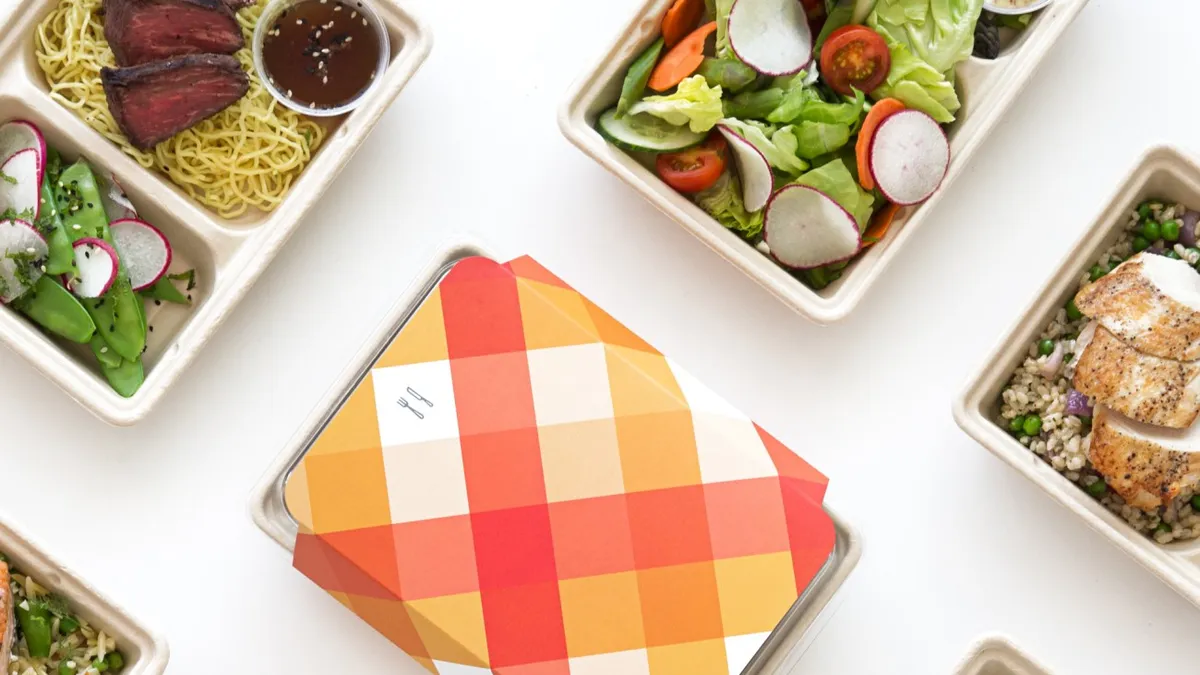Dive Brief:
- Less than a year since laying off 30% of its workforce and retreating to the Bay Area, the 9-year-old Munchery shuttered completely on Monday, CNBC reported. In an email to customers, the company said outstanding orders would be canceled and refunded.
- Valued at more than $300 million, the meal kit and food delivery company raised $125 million in venture funding. Its mission morphed from a ready-to-eat meal delivery service to meal kit delivery, launching an $8.95 a month subscription plan for 20% off meals and opening an outpost in a San Francisco commuter train station, according to TechCrunch.
- Munchery joins a spate of other failed food delivery startups, as the rapidly changing marketplace has favored restaurant delivery from the likes of Grubhub, DoorDash, Postmates and Uber Eats. Fellow San Francisco delivery company Sprig closed in 2017, as have Spoonrocket and Bento, according to Eater.
Dive Insight:
Munchery tried a few tricks to capture consumer attention, but none ultimately paid off. The company likely suffered from expansion that just didn't work, opening outposts in Seattle, Los Angeles and New York, only to shutter all of them last May, according to TechCrunch.
Despite raising $87 million in 2015, Munchery struggled in every operating city, eventually cutting corners to stay ahead. In 2016, Bloomberg reported that the company wasted as much as 16% of its food and routinely "begged its cooks to bring down the cost of the ingredients," with former employees citing investor greed as a regular affair. In response to a Business Insider inquiry after the scathing Bloomberg report, Munchery denied wasting food, saying its kitchens donated unused food every day. The statement also noted the difficulty in predicting customer demand.
But grocers, restaurants and caterers anticipate their food orders every day. Perhaps Munchery was more interested in investor dollars than a truly sustainable business, but given the quick decline of competing meal delivery services disconnected from restaurants, this demise could be indicative of a larger trend.
Blue Apron, the arguable leader of meal kit delivery, watched its stock plummet 90% in a year and a half, diving from its June 2017 IPO of about $9 a share to under $1 last December. It, too, wrestled with negative press about its waste — albeit not of the food variety. The meal kits arrive perfectly portioned to serve two or three meals to two adults, but every item was wrapped in plastic or sealed in a miniature jar, packed neatly into a box stuffed with photo-sized freezer packs of non-biodegradable coolant.
Munchery tried to emerge from the meal kit corner, selling pre-fab food to the likes of Amazon Go stores and offering gourmet microwavable dinners. It promoted new sustainable packaging and, based on its recent blog posts, seemed to promote its meals as healthy alternatives to restaurant meals.
The harsh operational realities of sourcing, cooking and packing fresh foods cause enough headaches, but Munchery also fulfilled delivery. Meal kit competitors, including HelloFresh and HomeChef, meanwhile, have in a sense been pulling back from 100% delivery models, filling endcaps at Kroger and other major retailers. Amazon could also be exploring the space with its mysterious "new perishable food platform."
Somewhat surprisingly, meal kit subscriptions jumped 67% last year. Understanding of the target market — middle-income millennials early in their careers — has also evolved, and makers have realized that these customers enjoy experimenting with flavors without spending too much time in the kitchen. It's not an easy fulcrum on which to balance, however, as exotic flavors or certain foods might not travel well, no matter who makes them or how they get to a customer's plate.
Sprig and Maple also failed in the make-and-deliver model, though both focused on prepared meals rather than make-at-home kits. At the time, Sprig CEO Greg Biyani noted the "complexity of owning meal production through delivery at scale," which is perhaps the biggest question in the broader food delivery space right now.












